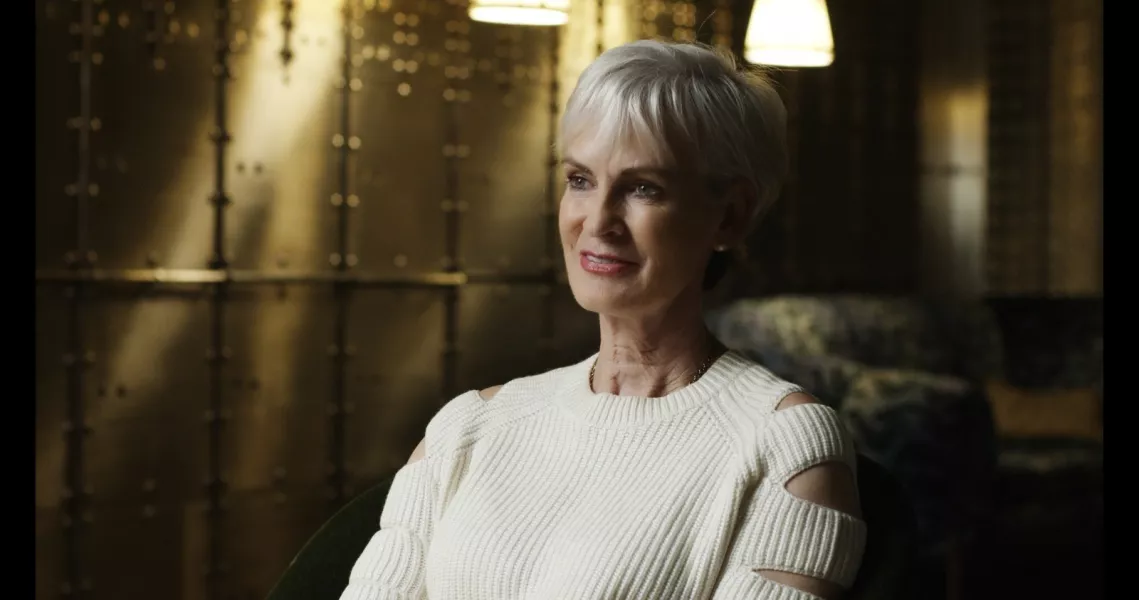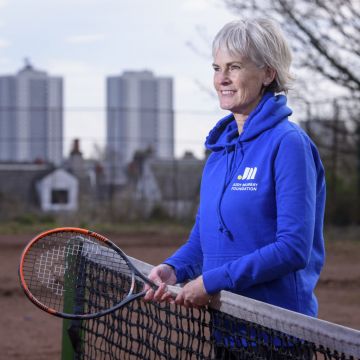Sport, by its nature, breeds competitiveness. Pushing the human body to its absolute limit, athletes involved at the highest international levels endure gruelling training regimes, restrictive diets and anti-social work schedules in a bid to reach their full potential.
However, it’s often the untold psychological pressure and media scrutiny accompanying life in the spotlight that have the most punishing impact on athletes and their families alike.
Women in the sporting arena are no exception. It’s something Judy Murray, 61, tennis coach and mother of British tennis champions Andy and Jamie Murray, knows all too well. “If you’re going to take a young athlete on a journey that may lead them to superstardom, you need to prepare them for everything that will be part of that journey,” remarks Murray earnestly. “And not just them, their immediate family as well, because it affects everybody.”
Teaming up with executive producer Rosemary Reed and Sky One as part of new 10-part series Driving Force, the programme looks beyond an athlete’s final performance to uncover the relentless work that paves the way for success. Highlighting the positive, but also the hauntingly negative facets of women’s top-tier competitive sports, the series sees 10 of Britain’s best-known female Olympic champions speak candidly about the euphoric highs and untold lows that have defined their careers.
Excited to show the Digital reveal of a new series I am in. Starts from 24th November- @JudyMurray hosting on @skytv platforms @SkySports
It’s discovering who and what were the driving forces behind elite women in sports success.#drivingforceseries pic.twitter.com/d3iLmsIi1YAdvertisement— Becky Adlington (@BeckAdlington) November 12, 2020
It’s a series that strikes a very personal chord for Murray, following years of public scrutiny supporting her sons on the international tennis circuit. “I kind of got catapulted into the spotlight during Wimbledon 2005,” she says. “Andy was about 18 and totally unexpectedly made the third round and ended up playing on the Centre Court on the middle Saturday. The nature of tennis is such that – Wimbledon in particular – if you’re watching on the TV, there’s no ad breaks and the cameras and the commentators need somewhere to go.
“So I found myself being picked out a lot – whether I was clapping, whether I was smiling, whether I was punching the air, baring my teeth, whatever it was – and the pictures that they used of me were always the aggressive ones. And they immediately created this image of me as being the overbearing mother, too competitive, too pushy, et cetera, et cetera, and it just continued from there.”
It’s a source of frustration for the tennis coach, who now uses her platform to raise awareness of women’s tennis – and the wider topic of females in sport, through projects like Driving Force and the Judy Murray Foundation. “If my kids had played rugby or cricket or football I’d have been lost in the crowd with all the other parents, nobody would ever have seen me,” she continues. “The nature of tennis puts you in the spotlight in a way that probably no other sport does, with a parent who’s just watching their kids playing and supporting them.”
As a traditionally male-dominated industry, over the years sport has exposed audiences to testosterone-driven outbursts and physical altercations in equal measure. However, both Murray and Reed strongly believe females in the same arena, and those on the sidelines, continue to be held to a different standard from their male counterparts.
“The other thing I realised back then was that, if I had been the father of sons or the mother of daughters, I wouldn’t have been picked out in the same way – it was like there was something wrong with being a competitive woman,” reflects Murray. “Nobody prepares you for what you’re going to face. Nobody prepares you for people door-stepping you or following you up the road or camping in vans outside the little flat that you rented for a fortnight or whatever it is.
“And I think that was one of the things that came out a lot in the series with the girls, particularly for those who achieved gold medals in different disciplines, in different Olympic Games unexpectedly [and] when they weren’t expected to win. They were scared of being tripped up in an interview, being a headline they didn’t want – something other than winning a gold medal. Nobody prepared them for life after success.”
It’s a subject at the very heart of Driving Force, as British athletes including Victoria Pendleton, Dame Kelly Holmes, Steph Houghton, Natasha Jonas and Dina Asher Smith discuss their paths to victory, alongside the stark mental health battles many of them faced. Sports fans can also expect guest appearances from the likes of Billie Jean King, Andy Murray, Jamie Murray, Venus Williams, Sebastian Coe and Martina Navratilova.
Delving into each athlete’s journey, we discover the coaches, support systems and sacrifices made to help guide the athletes from grassroots potential through to international stardom. “In the run-up to London 2012, it was a home Olympics, we wanted success, there was investment, Lottery funding and so forth,” says Murray. But with Covid-19 putting huge financial strain across men’s sport, not to mention the knock-on impact on the lesser-funded women’s teams and sporting programmes, raising the profiles of female athletes has become more important than ever.

“The success of the Lionesses; the women’s rugby; England women’s cricket – winning the World Cup; the netball; and the hockey – these are world-class performers and they are teams – that has enormously raised awareness,” says Murray. “Team sport is huge for engaging the nation, you can rally numbers behind a team. Now, we’re trying to raise the profiles of them as individual athletes.
“They all work hard to give back to their sport in some way, whether it’s encouraging kids to learn to swim or Kelly Holmes, [she] has a marvellous foundation that supports young athletes and mentors them. They understand the importance of them as role models. If you can see it, you might believe that one day you could be it.”
The first episode of Driving Force premieres on Sky One on November 23.







